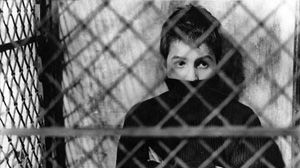
 This film is like a smoldering fire, that never flares very high, but steadily, inevitably consumes its protagonist. Jean-Pierre Léaud does an amazing job in the lead role, setting the temperature of the entire film with his stoicism and reserve. He is in virtually every frame, which is a bit ironic since so much of what happens depends on everyone but him. The result is a claustrophobic sense of powerlessness. The audience is never given a way (or a reason) to identify with Antoine's parents or teachers; the world is simply there, at every turn cruel to varying degrees, but without any definitive reason why.
This film is like a smoldering fire, that never flares very high, but steadily, inevitably consumes its protagonist. Jean-Pierre Léaud does an amazing job in the lead role, setting the temperature of the entire film with his stoicism and reserve. He is in virtually every frame, which is a bit ironic since so much of what happens depends on everyone but him. The result is a claustrophobic sense of powerlessness. The audience is never given a way (or a reason) to identify with Antoine's parents or teachers; the world is simply there, at every turn cruel to varying degrees, but without any definitive reason why.The whole of the film is masterfully designed and executed. Its boundaries are narrowly drawn, and within them it seems entirely complete. Truffaut's work is solid, plain, and immersive. Léaud's performance is well supported by those around him, especially his friend René, who is really the agent of Antoine's downfall, but without any malice or false intent. The contrast between the two is a subtle but illuminating study in what it takes to get ahead in the world.
Really, fire is the wrong metaphor for this film. Antoine isn't so much consumed as he is trapped. The movie's events unfold like a game of chess, and try though he might, he can't avoid that end. Still he never seems desperate, or for the most part even unhappy. The one exception—and certainly the most powerful moment in the movie—is his ride to the Observation Center (which parallels the marvelous opening-credits sequence). Léaud is in full control here, as we see the weight of misfortune settle heavily onto Antoine's shoulders. Still, he's soon back to his stoic self. In the end, though he has no clear path to a better life, as he stands on that seashore he does seem to have a glimmer of hope in his eyes. Here, as throughout the movie, one can't help but feel it with him.
No comments:
Post a Comment